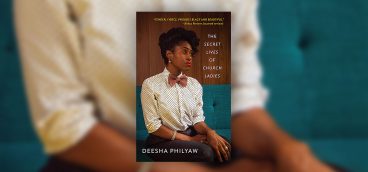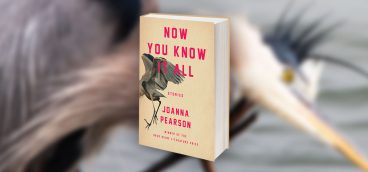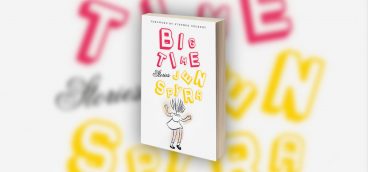These are tough times for aspiring romantic heroines. Gone are many of the obstacles that for centuries prevented women from achieving personal freedom, sexual liberation, social mobility, financial independence, true love and an authentic voice. Society now tolerates a host of behaviors once deemed shocking.
And without the impediments of yore— the fire-breathing dragons of frustrated sensuality, the fearsome ogres of public disapproval, and the insurmountable walls of class distinction—what once passed for brave idealism now looks suspiciously like narcissism. What’s a girl to do?
In her ambitious debut novel, “What Happened to Anna K.,” local author Irina Reyn takes on no less than one of literature’s great heroines, Anna Karenina, and re-imagines her for the 21st century. Readers expecting a retread of Tolstoy’s 1877 classic are in for a surprise—and a treat. Reyn’s Anna is a distinctly post-modern protagonist; sexy, stylish and self-absorbed. She is both contemptible and thoroughly believable, a curiously sympathetic anti-heroine undone by her own quixotic sensibilities. This fresh and clever adaptation, like the original, is both a wonderful story and a true novel of ideas. It retains nearly all the major themes—religion, ethnicity, morality, modernity, family, freedom, betrayal, forgiveness, happiness and the purpose of life—sacrificing only some 400 pages of superfluous business and Tolstoy’s long passages on farming, neither of which are likely to be mourned or missed. Originally issued last year, “Anna K.” is now available in paperback just in time for summer. Grab a copy and head for the hammock—it is a thing of beauty and a joy to read.
Anna K. Roitman is the only child of indulgent emigrés from the former Soviet Union. She enjoys all the benefits of contemporary Western culture, yet longs to be the central figure in a great novel of the old school. To this end, she has spent the better part of four decades on an illusory and often embarrassing quest for a man whose words will transform her existence into something exceptional. Surely she is too beautiful, too sophisticated, for the ordinary life of the “sausage immigrants” that populate the predominantly Russian neighborhood of Rego Park, Queens, where she grew up, and too intellectual, too passionate for the bourgeois materialism of her husband’s social set on the Upper East Side.
So when she meets (in a railroad station!) an appropriately disheveled, distracted writer who approximates her vision of a hero, Anna enthusiastically embarks on an affair with him, confident that he will immortalize her in prose. The fact that her lover is her cousin’s boyfriend carries no more weight with Anna than her obligation to her husband and infant son. (In a succinct and witty variation of Anna Karenina’s sobbing speech to her lover, Vronsky, following the consummation of their affair, Anna K. simply declares “Now you will have to write about me.”) Time passes, passion wanes and eventually Anna, over forty and freaking out, realizes the sad truth of her imagined fate and, like her famous namesake, leaps rather hastily in front of a train. Without the promise of the longed-for novel to bring her to life, she chooses death, achieving at least a tabloid notoriety in lieu of the literary celebrity that has eluded her.
Although both fictional Annas follow the same doomed trajectory, readers who may have wept at Anna Karenina’s suicide will only shake their heads at Anna K.’s sordid end. In the absence of the moral constraints confronted by Tolstoy’s heroine, Anna K.’s story isn’t tragic, only pathetic. She is the victim of neither fate nor circumstance, just egoism. Even her talk of love is mostly lip service, for she takes no interest in anyone else beyond their ability to reflect her own self-image. (“What do you love about me?” she asks her husband and his rival, weighing their answers to determine a winner.)
The pleasure of seeing “her idealized self refracted through someone else’s gaze” is precisely what forms the basis of Anna’s initially close relationship with her sweetly selfless cousin, Katia, who serves as Anna’s foil. As a member of a conservative community of Bukharian Jews, Katia’s world is tightly circumscribed by a strict code of conduct. She must dress modestly, avoid worldly temptations, save herself for her husband, marry within the same ethno-religious group and embrace the role of traditional wife and mother. Conditions are ripe for a rebellion that could give her the coveted heroine status, but Katia accepts it all with an unquestioning submission that is nearly as disappointing as Anna’s self-indulgence.
As selfish as Anna is, her character is redeemed by her deep love of literature. Readers devoted to the great books will feel Anna’s pain when her cretinous friends dismiss her bible, “Wuthering Heights,” as nonsensical and prefer Danielle Steele to Dostoevsky. Their casual, recreational view of reading denigrates Anna’s whole philosophy of existence. She lives “most fully not in life, but on the page,” rejecting the facts before her “in favor of characters and situations and myths operating more vibrantly inside her own mind.” What ardent reader, lost in a good book, hasn’t at some time known the same sensation? Who dares judge her too harshly?
Anna may not be a sheltered virgin like Katia, but like Katia, whose reputation has been damaged by a boastful lie, she is the victim of a fiction. In fact, she is the victim of fiction, period. She is a fallen woman, as Anna Karenina was, but not because of an illicit love affair. Anna K. is a casualty of unrealistic expectations, ruined by reading. As a lonely child she “saw herself in Natasha, Margarita, Jo, Catherine Earnshaw, Elizabeth Bennet, all those heroines the novels would refer to as ‘plucky,’ ” and later imagined herself as a devastating femme fatale, “willing powerful lovers to prostrate themselves before her, allowing them to sob their love,” precisely as Vronsky did to Tolstoy’s heroine.
The trouble comes when Anna insists upon applying these literary precedents to her real life. When considering the value of her extramarital affair, for instance, she decides it must be worth the sacrifice of her comfortable home life, because it has to be. “Why had she spent her entire childhood and adolescence reading?” she wonders. “All those journeys with their preordained conclusions, surely they led to something.” In her case, of course, they lead to disaster.
Paralleling Anna’s story is the tale of another Rego Park romantic, Lev Gavrilov, who finds his happily-ever-after. Lev (once Tolstoy’s farmer, now transformed into a pharm-acist) has an interior life determined not by novels, but the classics of French cinema. Although he understands the necessity of separating fact from fiction, he just isn’t ready to take the next step. That is, not until he has an opportunity to obtain the hand of the fair, and unfairly maligned, Katia. Like Anna, he pursues his heart’s desire, only to discover the meaning of the adage “be careful what you wish for.”
His bride, whom he long imagined as the lost and lovely Vasilisa of Russian folklore, is in fact a pretty uninspired housewife, who berates him for his negligent lateness, makes honey-do lists and cuts his dinner into bite-sized pieces before serving it. But Lev, upon waking from his dream, doesn’t kill himself, or leave, or have an affair. Instead, he adjusts his expectations and works hard at the business of being happy, learning to respect his wife and accept the limitations of the married state. Even when Anna, in a final desperate effort to shore up her self-esteem, attempts to seduce Lev, he stands his ground and shuts the door. His decision is the correct one, his chosen life balanced and adult.
Lev’s steadfastness technically makes him the true hero of “Anna K.,” just as Tolstoy’s Levin prevailed in “Anna Karenina.” But readers won’t put down the book thinking of him. They’ll linger instead on the image of Anna K., the romantic reader, who, for all her faults, remains true to her literary illusions even unto death. Flawed she may be; vain and self-important, but the inspiration nonetheless for a great book.





